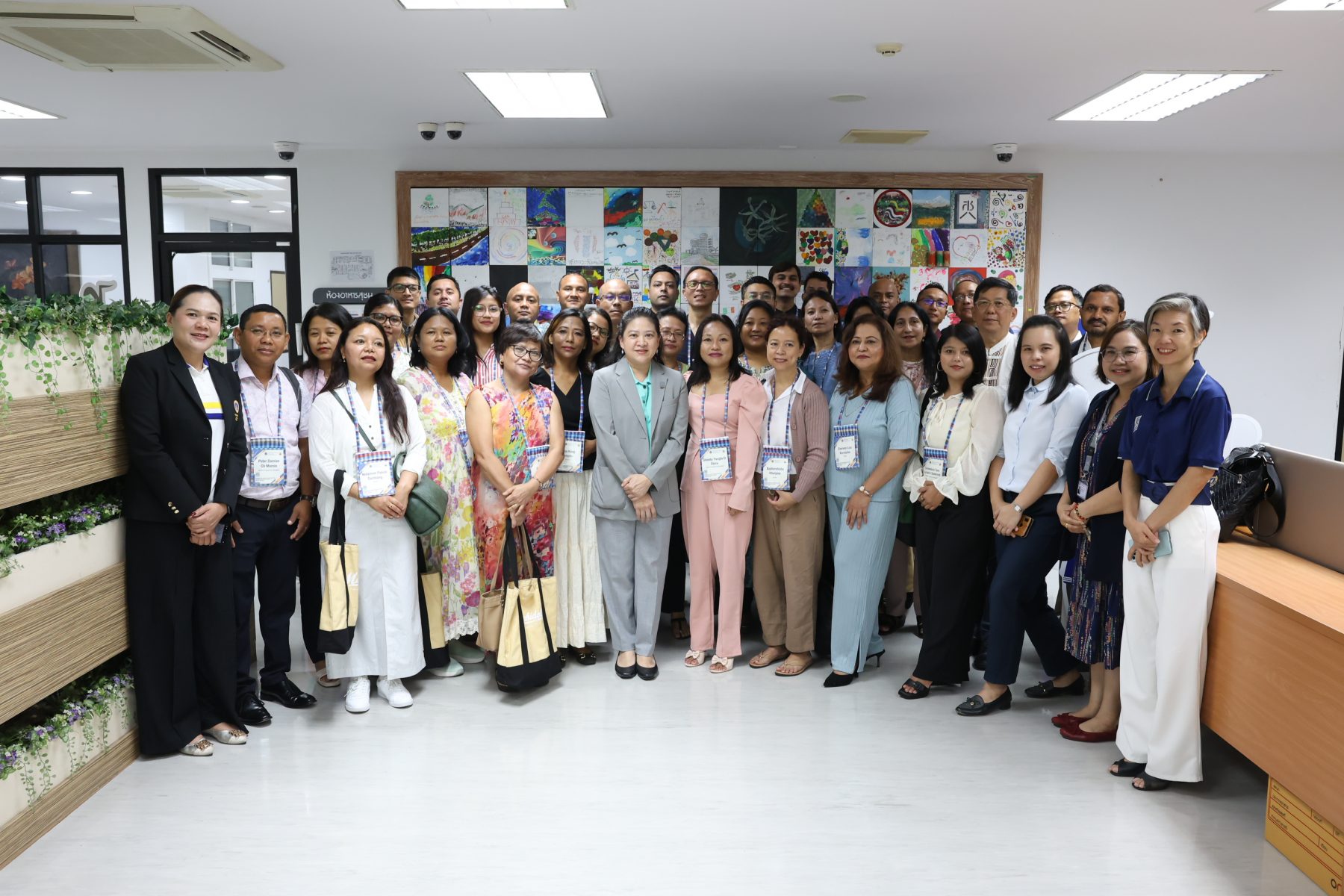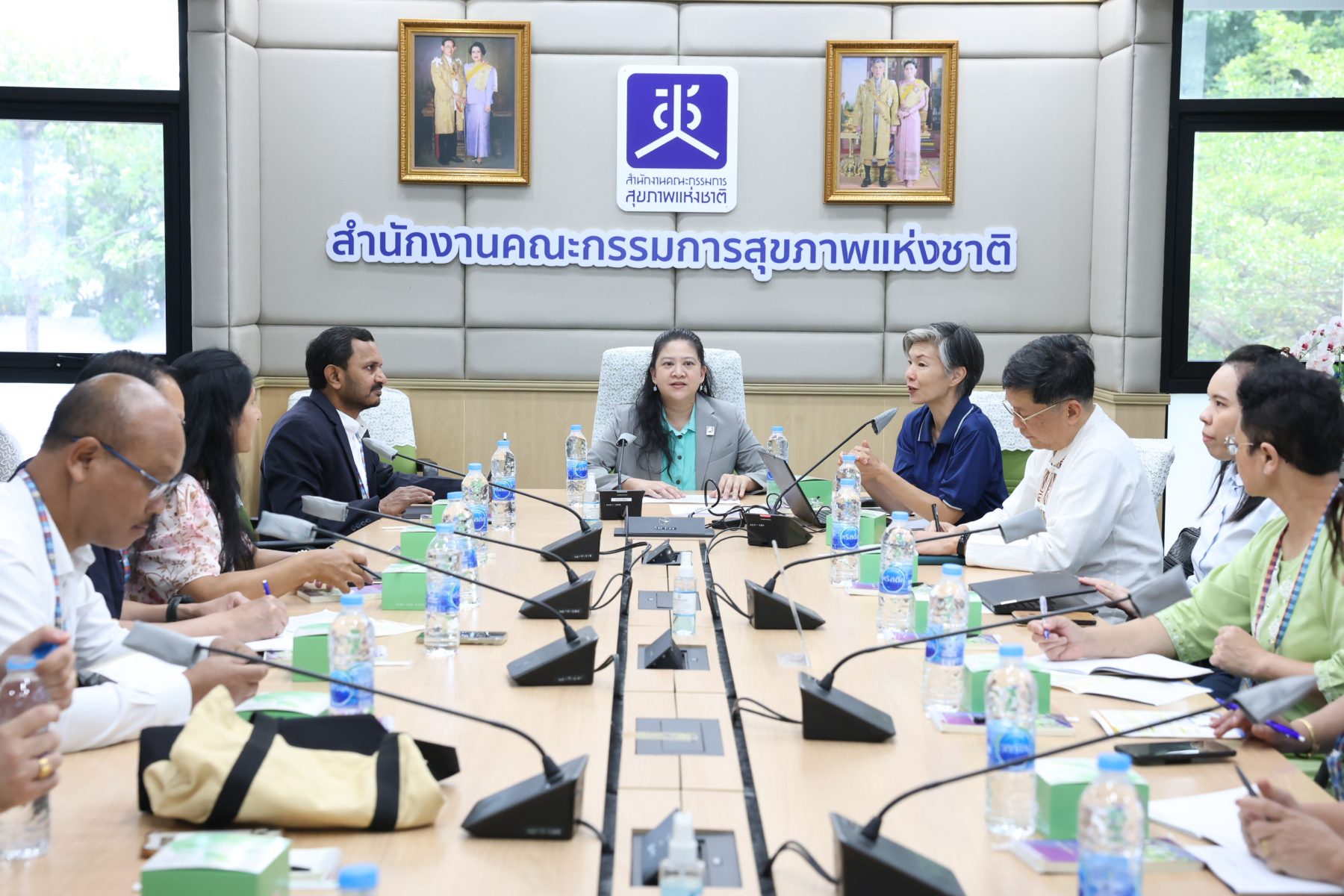
The delegation from Meghalaya India visits NHCO Thailand to learn about responsive policy approaches for strengthen a comprehensive health system.
Writer: Khanitta Saeiew, April 2025, Photo credit: Media Team, NHCO
April 29, 2025 – The delegation from ministry of public health and welfare from Maghalaya state of India visited Thailand National Health Commission Office (NHCO) on April 29, 2025, with an aim to study policy innovation through responsive policy approaches including mechanisms that support a development of comprehensive health system of the state.

The study visit was the third batch to come to Thailand, organized by the ASEAN Institute for Health Development (AHID), Mahidol University. The delegation consisted of national and district-level government officers. During the visit, the study group was introduced to an overview of NHCO’s work, highlighting that the hearth of NHCO lies in promoting social participation for responsive policy through participatory tools, as outlined in the National Health Act 2007. The session was led by Dr Tipicha Posayanonda deputy-secretary of National Health Commission, and Miss Nanoot Matharupote, Director of the Global Collaboration Department.

The overview of Meghalaya was presented by Dr Sampath Kumar, the Principal Secretary of the Government of Meghalaya, India. The Principal Secretary explained that Megalaya is located in the northeastern part of India. While it is a beautiful and hilly state, it face significant geographical challenges particularly in delivering health care services. The state comprise 12 districts with approximately 7,000 communities including several minority groups with diverse local language. Mehalaya has a health care system with facilities at all levels, including tertiary hospital at the state level, district hospital and community health center at district level. Notably the state has successfully reduced its mortality rate by 50% in the last four years. Additionally, the state allocates more than 8% of state budget on health care and place strong emphasis on strengthening the governance for health system and promoting community-based approaches to control decease.
During the presentation to the visiting delegation, Miss Khanitta Saeiew, a senior technical officer, presented a case study on responsive policies at both national and community levels, including the health schemes available for Thai. She provided an overview of the country’s healthcare schemes and the distribution of health facilities across all levels, ranging from tertiary hospital to over 9,000 primary care units. Despite Thailand has strong health system, challenges such as non-communicable diseases, air pollution, and geographic disparities remain. Emphasizing the importance of social participation in health governance, NHCO highlighted mechanisms such as National Health Assembly and the School Health System Charter at the community level.
The participatory approach aims to ensure inclusive decision-making, as reflected in global and national strategies, including SDG 16, WHA Resolution 77.2, and Thailand’s 20-Year National Strategic Plan. Autonomous health agencies such as NHCO, NHSO and ThaiHealth work along side the Ministry of Public Health to support the development of the health system, with NHCO taking the lead in fostering multi-sectoral collaboration and participatory policy processes involving over 200,000 people annually. The presentation also emphasized collaboration with local stakeholders to respond to community needs as demonstrated by the School Health System Charter, which reflects the concerns of community members, teachers, and families in protecting students from e-cigarette use.
Several question were raised during the visit, including the main mechanisms for implementation the School Health System Charter, the selection process for the 200,000 participants in the participatory policy process, and how NHCO works with other ministries and agencies to implement resolutions when it is not the main authority and technic for participation processes.
During the presentation to the visit delegation, Miss Khanitta Saeiew, a senior technical officer, provided the case study on responsive policies for both national and community level including health schemes for Thais. She explained that overview of the country’s health care schemes and the distribution of health facilities across all levels, from tertiary hospitals to over 9,000 primary care units. Despite Thailand’s strong health system, challenges such as non-communicable diseases, air pollution, and geographic disparities remain. Emphasizing the importance of public participation in health governance, NHCO highlighted mechanisms such as the National Health Assembly and school health system charter for community level.
The participatory approach aims to ensure inclusive decision-making, as reflected in global and national strategies including SDG 16, WHA 77.2 resolution and Thailand’s 20-Year National Strategic Plan. Autonomous health agencies such as NHCO, National Health Security Office (NHSO), and ThaiHealth Promotion Foundation work alongside the Ministry of Public Health to support health system development, with NHCO taking the lead in fostering multi-sectoral collaboration and participatory policy processes involving over 200,000 people annually. The presentation also emphasized the collaboration with local stakeholders to strengthen and response to local needs which seen from the school health system charter which response to the need of community members, teachers, family to protect students from smoking e-cigarette.
Several questions were discussed during the visiting including the main mechanism to drive school health system charter, selection process for 200,000 people for the participatory policy process, how to work with other related ministries and agencies to implement any resolution when NHCO isn’t the main authority.
